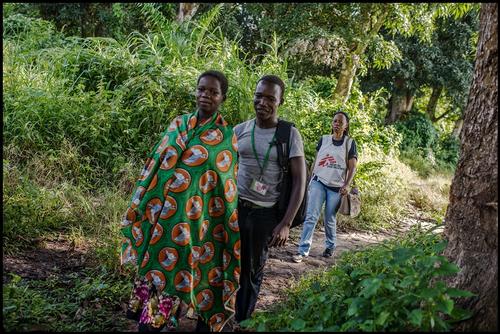On the bright morning of 3 November 2014, Adem, a 29-year-old mother of three arrived at the Yambio State Hospital’s maternity ward with advanced labour pains. While taking her medical and obstetrical history, the medical team discovered that she had undergone a caesarean section on 3 November 2013, exactly a year before. Unfortunately, due to her late arrival and delivery complications, she had lost the baby then.
This means that she had tried and successfully got pregnant again barely three months after the operation. This is a common practice among women in Yambio. When a mother loses her baby during delivery, or through a miscarriage, they try as much as possible to conceive again, immediately after. They believe that having another child will replace the sad experience with a happy one. However, this can sometimes be risky.
Making the hard choice
Due to her last experience, Adem was reluctant to come to the hospital. She wanted to deliver from home, so she stayed there too long and was once again brought to the hospital late – when her labour pains were very advanced.
Home delivery is common in Yambio, and most women are afraid of delivering in a hospital due to lack of sufficient knowledge of the advantages of hospital delivery, adverse cultural beliefs, as well as other socio-economic factors. Such are the norms that cause the loss of so many lives, and which Information, Education and Communication (IEC) teams in Yambio are trying to help the community move away from.
Because Adem’s scar was barely a year-old and the risk of a uterine rapture was imminent, doctors decided to perform a caesarean section. However, Adem wanted to deliver normally, and it took a long time and lots of counselling both for her and her family to finally get her into the operating room.
Fear confirmed, doctors act to save lives
During surgery, the doctors’ fears were confirmed, Adem’s uterus had ruptured. Even though it took the MSF doctors hours, counselling Adem and her family on the urgency of a caesarean section, they had finally managed to convince her and fortunately, out came a bouncing baby boy weighing 3.01 kg. They had managed to save both the baby and the mother.
Alive and happy
When Adem regained consciousness, the doctors and the counsellor explained to her what had happened during the operation and she exclaimed saying, “I risked losing my baby again! This would have finished me. I was lucky that it wasn’t too late.”
Adem was happy with the counselling she’d been given by the team that made her make a wise decision. The consequences of any other decision, she now knows, would only have led to a tragic end, too sad to ponder now, with this wonderful child looking up at her.
Adem and her baby were discharged four days later in good health.
Where IEC meets medicine
Adem’s situation is not new to the Yambio context. It is one of the reasons why IEC teams go out every morning to educate the community, and answer any questions regarding maternal and child health that mothers, fathers, entire families and the community might have.
IEC forms an integral part of MSF’s work at community and hospital level. IEC teams use different types of communication to deliver their messages. Broadcast media is one means of communication with a wide reach and large listenership in Yambio. MSF uses radio to disseminate health information, create awareness around certain problematic issues like delivering in a health facility, the importance of antenatal and postnatal clinics. They also use the opportunity to get feedback from the community.
In fact, in the 10 years that MSF has been working in Yambio, IEC has significantly contributed to a behavioural change in the way women in general, and expectant mothers in particular, access medical care.
IEC is also used to inform and improve the referral system: from the community to the hospital, as people are informed of the services that MSF offers, where and how to find those services, so when they come across a complicated case, the local community organises to transport the sick to the nearest health centre or hospital; or from the primary, often local communal health centres to the hospital and vice versa.
Yambio is the capital of Western Equatoria State. The state has the highest maternal mortality in South Sudan, which in turn has one of the highest rates of maternal deaths in the world. Cultural practices, traditional beliefs, social and economic constraints continue to hamper access to healthcare.
Like Adem, most women suffer or succumb to death simply because they do not have sufficient information on maternal and child health issues. From this, one understands the vital importance of the IEC component in MSF’s work.
“It is such a traumatic event to lose a mother when you know that most maternal deaths can be prevented. Most of them come in late, in very dire conditions and we do our best to save them. In the end, even though you know you have done your best with the resources you have at hand, it is still painful to lose a life,” remarks Lisa Errol, an Australian-born midwife, who has just finished her mission in Yambio.



